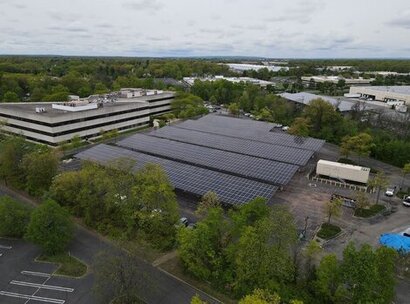
The project is expected to generate 18 GWh of clean electricity annually and will push the university towards its goal of achieving carbon neutrality by 2040. It will significantly add to the existing inventory of solar canopies that currently cover 33 acres of the Livingston Campus.
“Beyond the obvious environmental and societal benefits aligning with the recommendations and objectives of the Rutgers Climate Task Force and the work they are doing, just as important, is that lowering our utilities' costs will have a positive downstream effect benefiting our students and their families with respect to the cost of attending Rutgers” said Antonio Calcado, Executive Vice President and Chief Operating Officer.
The project, expected to generate 18 GWh of clean electricity annually, will push Rutgers towards its goal of achieving carbon neutrality by 2040
At no upfront cost to the university, the projects are being financed through a power purchase agreement (PPA), in which DSD will design, build, own, operate, and maintain the solar canopies across campuses for a 15-year term. Over that time, the generated power will be purchased by Rutgers Division of Institutional Planning and Operations (IP&O) at a significantly discounted rate compared to the local utility.
“It’s an unconventional project in that we are not spending university funds, but accruing significant benefits,” said Frank Wong, IP&O’s Assistant Vice President, University Planning and Development. “The project will significantly reduce our energy costs over time and be a visible sign of our ongoing sustainability efforts.”
Construction is currently underway across several of the university’s campus parking lots, and the projects are expected to be complete in late 2023. Once complete, the carports will create shaded parking lot coverage, reducing urban heat island effects of surface parking lots and providing cover from snowfall/precipitation during winter months, while providing clean energy to university buildings and operations.
“Under the power purchase agreement, we buy the electricity at a predetermined cost” explained Michael Kornitas, IP&O’s Director, Sustainability and Energy. “Because there are no transportation costs associated with delivering solar power to the university, the kWh cost is greatly reduced.”
DSD was awarded the project through a competitive bidding process, and was ultimately chosen based on its deep experience in developing large scale solar solutions for MUSH market customers.
For additional information:

